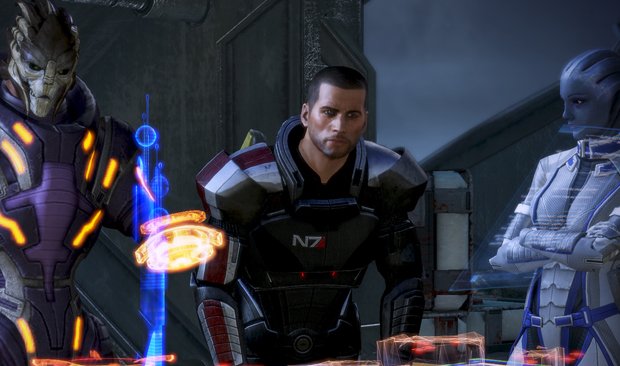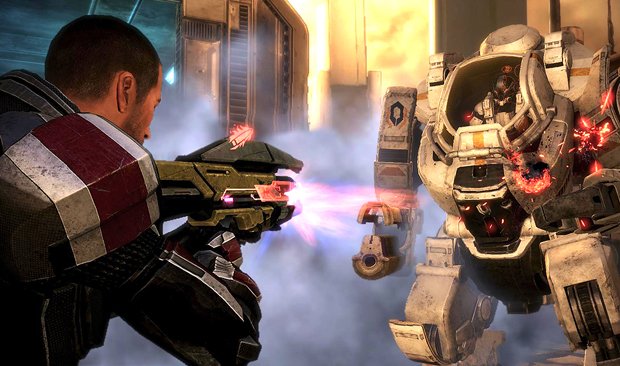Game designers have become afraid of their own voice (and it's all your fault)
An artist that crowdsources his work is no artist
“So, you want a realistic, down-to-earth show... that's completely off-the-wall and swarming with magic robots?”
- "The Itchy & Scratchy & Poochie Show", The Simpsons
So concludes one hapless focus group leader when, in an effort to lift the flagging ratings of "The Itchy & Scratchy Show", he hauls in a bunch of kids and asks them, point blank, what they want to see from their favourite cartoon. Their scattergun responses, contradictory at best, highlight the uselessness in tailoring content to the audience that demands it - not that the public doesn’t know what it wants, but that in making the one product everything that they love, they will invariably create something that they’ll hate.
Putting the consumer in the creator’s chair is a bad move for any creative endeavour. While it may seem like a shortcut to success - you’re giving them exactly what they want, after all - chances are it’ll result in an incompatible mix of ideas; a rudderless, overburdened boat that’s liable to sink just after it leaves port. It speaks not only of an uncertainty of the creator’s own message, but a feeling of safety that comes from simply regurgitating the messages asked of it.
Which is why this tweet from Mass Effect executive producer Casey Hudson has me kinda worried...
We're in early stages of designing a completely new Mass Effect game. What would you want to see in it?November 8, 2012
It’s no surprise that Hudson is asking this. The debate surrounding Mass Effect 3's ending is no doubt still ringing in BioWare’s ears - we all know what happened there, let’s not unearth that one again. Following the fallout, it seems they’re keen to demonstrate to their fans and loyal customers that, hey, they are actually listening, they’re not a closed bubble at the top of the BioWare Tower. They want to make a game that you’re guaranteed to enjoy, and avoid a repeat incident of You Know What.
Is this the best strategy, though? To trust the consumer to have creative input? Look at the quote at the top of this piece - look at how ridiculous it sounds. It’s an extreme example, sure, but an everything-to-everyone approach runs that very risk, and risks becoming a jumbled mess of out-of-place puzzle pieces that are all present and accounted for, but don’t join together in any coherent way. Perhaps the creative agents in between - Casey Hudson, Mac Walters, BioWare’s story writers - will serve to filter and distill the cacophony of suggestions down to something workable, and for the sake of Mass Effect 4 I hope they do. Yet even if that happens, there’s another inherent problem: that BioWare saw it necessary to solicit suggestions at all.

Rather than producing a game that says “this is what we have”, Hudson, on behalf of the Mass Effect development team, sent out a tweet that says “tell us what you want.” They're asking, not telling. In the fallout of Mass Effect 3’s endi- sorry, You Know What, it’s a suggestion of a loss of confidence, a loss of self assuredness. They’ve got the fear. They’re afraid of their own direction. This is a company that doesn’t trust itself anymore, and it seems that it's our fault.
Sign up to the GamesRadar+ Newsletter
Weekly digests, tales from the communities you love, and more
Perhaps there’s also another reason at play: BioWare can use the strategy as a convenient out should they cop flack yet again from an angered consumer base. With the game incorporating suggestions and ideas from the public, they can point the finger back at us and say “But this is what you wanted! This comes from you!” It’s a shirking of responsibility, but every idea thrown their way will give them the permission - and the right - to deploy it.
Look, I don’t want to open up the whole “games are art” debate - that one can remain sealed inside that giant warehouse at the end of Raiders of the Lost Ark for all I care - but those charged with making a creative expression need to take ownership and responsibility for it, from inception through to execution. It’s their message, their collection of ideas. You can’t please everyone all the time, but you can make a statement confident in your own authority. An artist that crowdsources his work is no artist.
Parsing through your thoughts on the next #ME game. Would you be more interested in a game that takes place before the trilogy, or after?November 19, 2012
Perhaps I should revise my opening statement. The public doesn’t know what it wants. No, wait, that’s too strong. How about, the public shouldn’t be given that power. You, me, we shouldn’t have that power. It should be up to the storyteller, the ones in charge of the videogame - or the TV show, or the movie, or whatever - to make the experience they want. It’s their expression. It’s their baby. I’m not going to go up to a parent and tell them how to raise their kids; that’s their business. But the freedom of our creative culture is such that, if I don’t like something that someone’s done, I’m free to refuse it and move on to something else that does capture my interests. I have that right. So does everyone else.

Thanks for your feedback on what you want from the next #MassEffect game. Great texture and thought in your comments, which help us focus.November 21, 2012
In the same episode of The Simpsons mentioned above, when concern is expressed at the addition of a new character, Krusty the Clown says “Hey, this ain’t art -- it's business!” Perhaps it is. Yet with gaming such an expressive, creative medium, game designers should retain the guts to make the games they want to make, the way they want to make them. Gaming needs stories and experiences to come from people with the expertise in making them happen; I’d rather see them retain that power, rather than outsourcing the creative sparks to the people who are going to pay for them.
“I want to see your ideas,” said one brave soul in response to Hudson’s initial tweet.
So do I.
You know that kid at parties who talks too much? Drink in hand, way too enthusiastic, ponderously well-educated in topics no one in their right mind should know about? Loud? Well, that kid’s occasionally us. GR Editorials is a semi-regular feature where we share our informed insights on the news at hand. Sharp, funny, and finger-on-the-pulse, it’s the information you need to know even when you don’t know you need it.



